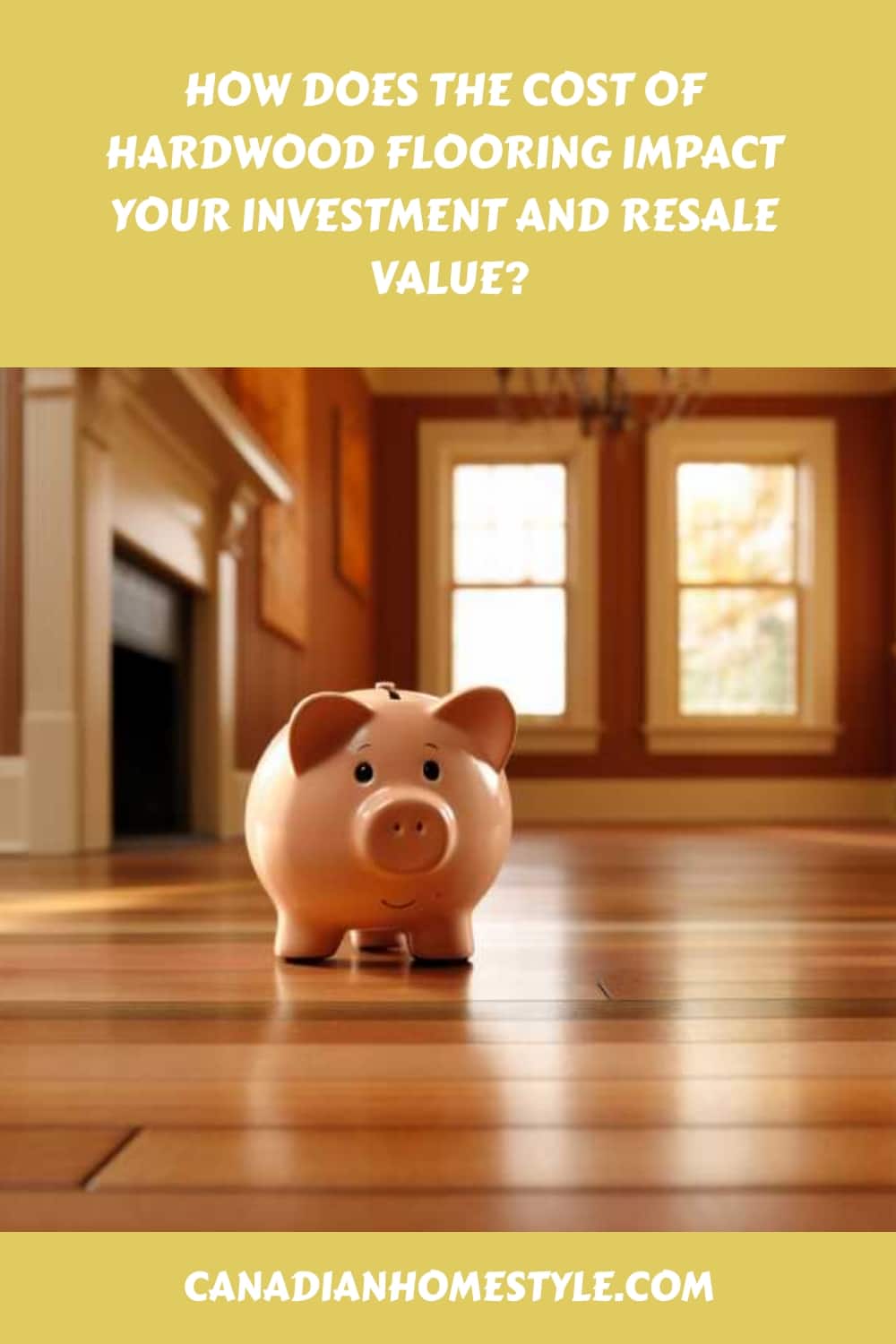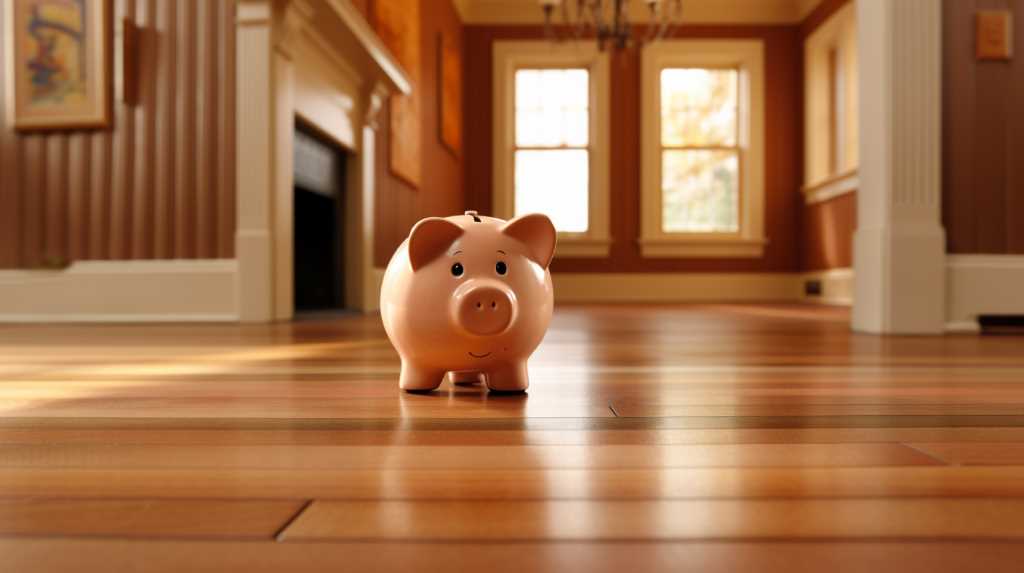
How Does the Cost of Hardwood Flooring Impact Your Investment and Resale Value?
Hardwood flooring has long been recognized as a valuable asset in the real estate market. Assessing the upfront costs of adding hardwood floors is crucial as it provides a clear understanding of how these costs add value to a house and affect your investment and resale value in the long run. By delving into the intricacies of hardwood flooring costs, you can make informed decisions to enhance your home’s value and allure potential buyers.
One critical factor to consider when assessing the cost of hardwood floors is the different types of flooring, specifically the type of wood used. The value that different types of flooring add to a home varies; exotic woods like Brazilian cherry or mahogany are more expensive but potentially add more value than common options like oak or maple. Additionally, the grade and quality of the wood, a factor in adding hardwood floors, can influence its cost. Selecting premium-grade hardwood will undoubtedly increase the initial investment. Still, it can also elevate the overall value of your property, as buyers often perceive higher-quality materials as indicators of a well-maintained and luxurious home.
Installation costs when adding hardwood floors are another crucial aspect to factor in. Hiring a professional to install hardwood flooring ensures a flawless and durable finish but can also add to the overall expense. However, opting for a DIY installation can save you money upfront, though it may impact the resale value if the installation is not done correctly. Buyers appreciate the craftsmanship and expertise of professional installations, so weighing the cost savings against the potential impact on your property’s value is essential.
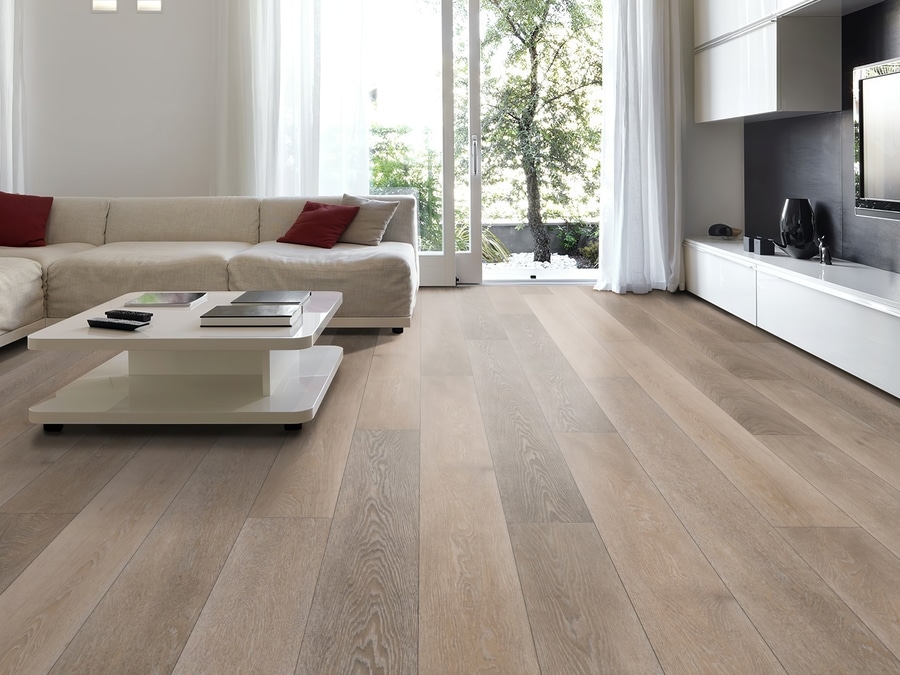
Maintenance and longevity are also significant considerations when evaluating the cost of hardwood flooring. While hardwood floors are known for their durability and longevity, they require regular maintenance to protect their beautiful appearance. This includes routine cleaning, periodic refinishing, and protection from moisture and scratches, essential elements in ensuring your new wood flooring adds much value to your home. Factoring in the long-term maintenance and preservation costs will give you a more accurate assessment of the investment value of hardwood flooring.
Beyond the financial implications, it’s worth considering the intangible benefits of adding hardwood flooring and how it could increase home value. The timeless appeal and versatility of hardwood floors increase home value and can attract various potential buyers, thereby increasing your chances of a quick and profitable sale. Hardwood flooring also offers excellent durability, particularly appealing to families with pets or children. By investing in new wood flooring, you are enhancing the aesthetic appeal of your home and adding hardwood floors that increase home value and provide a lasting and valuable asset.
Regarding your investment and resale value, the hardwood flooring cost is crucial. By carefully evaluating the type of wood, installation costs, and long-term maintenance requirements, you can make informed decisions that maximize the potential return on your investment. Ultimately, hardwood flooring offers a timeless and valuable addition to your home that can significantly impact its desirability in the competitive real estate market.
Key Takeaways
- Value of Different Wood Types: The type of hardwood used, such as exotic woods like Brazilian cherry or common options like oak, significantly influences the cost and potential value addition to a home.
- Grade and Quality Impact: High-grade hardwood can increase initial costs but potentially elevate the property’s overall value, perceived as a mark of a well-maintained and luxurious home.
- Installation Costs: Professional installation, while adding to expenses, ensures a durable finish and can positively impact resale value, compared to DIY installations.
- Maintenance and Longevity: Regular maintenance is key for hardwood floors‘ longevity, affecting long-term investment value. Costs include routine cleaning and periodic refinishing.
- Intangible Benefits: Beyond financial aspects, hardwood flooring adds timeless appeal and versatility, and can attract a broader range of potential buyers, enhancing the chance of a quick, profitable sale.
- Comprehensive Cost Evaluation: Assessing wood type, installation, and long-term maintenance is essential for understanding the investment value of hardwood flooring.
- Types of Hardwood Floors: Various hardwood floors are available, each with distinct characteristics – from solid hardwood for an authentic look to engineered hardwood for moisture resistance.
- Durability and Style Options: Hardwood floors offer durability and a range of styles to suit various preferences, such as oak for strength or maple for a contemporary look.
- Sustainable Choices: Modern consumers increasingly prefer eco-friendly options like bamboo, adding value to homes while being environmentally responsible.
- Long-Term Financial Planning: Considering installation and maintenance costs is crucial, as these can significantly impact the total investment in hardwood flooring.
- ROI from Hardwood Flooring: Investing in new or refinished hardwood flooring can yield a high ROI, significantly increasing home value, especially compared to other flooring types.
- Flooring Comparison for Budgeting: When budgeting, compare hardwood flooring costs with alternatives like carpet or vinyl, considering initial and long-term expenses and their impact on home value.
Understanding Hardwood Flooring: An Overview
When understanding hardwood flooring, it is important to have an overview of the subject. Hardwood flooring refers to using real wood as the primary material for flooring in homes or commercial spaces. The main appeal of hardwood flooring lies in its durability, natural beauty, and ability to increase the value of a property. Hardwood flooring is popular for homeowners due to its durability and timeless beauty. With its natural warmth and rich textures, hardwood flooring adds a touch of elegance to any room. It also has excellent longevity, lasting decades with proper care and maintenance. Whether you prefer the classic look of oak or the exotic beauty of mahogany, hardwood flooring offers a wide range of options to suit your style and preferences.
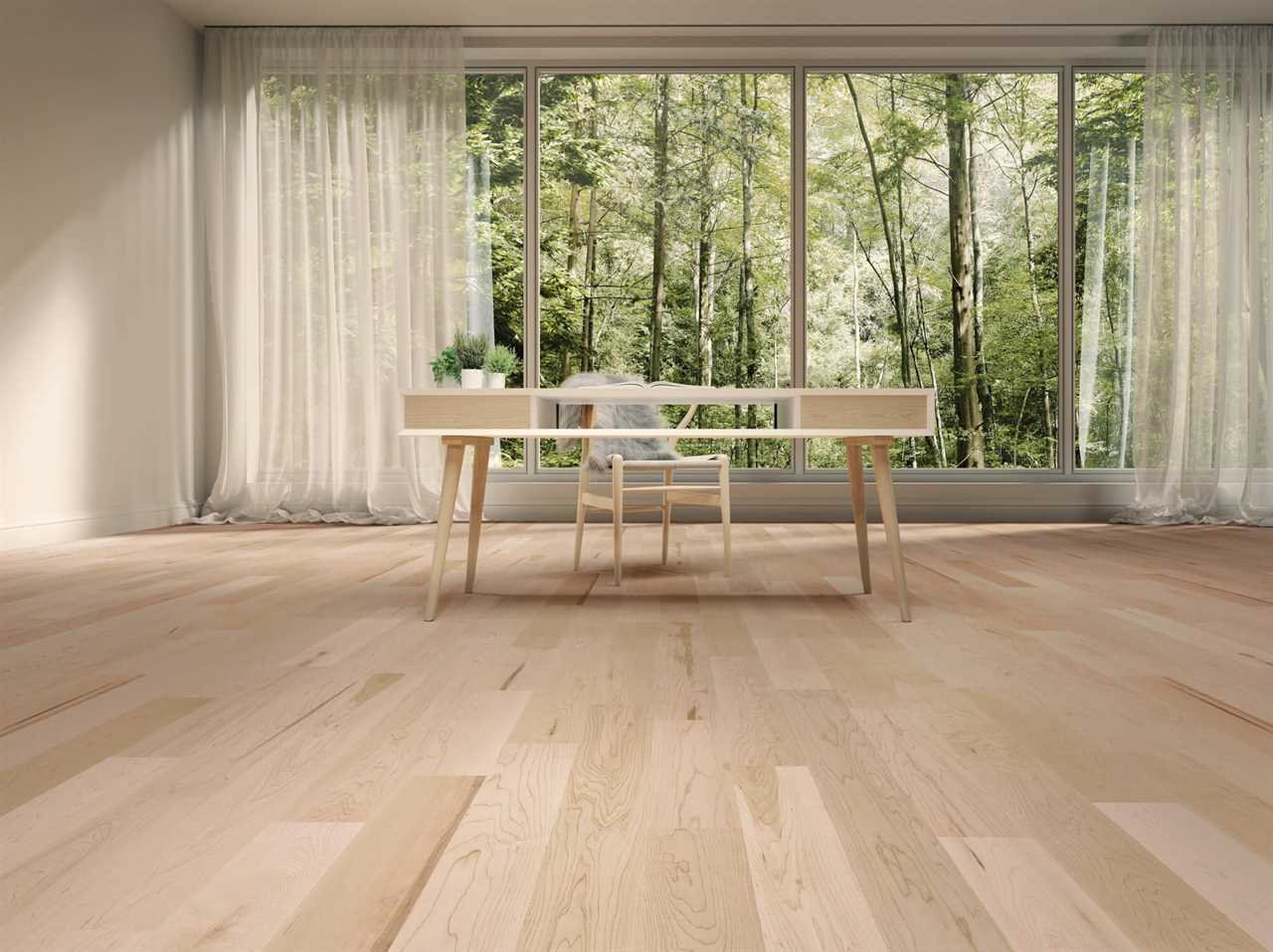
The Different Types of Hardwood Floors
Hardwood flooring is popular for homeowners due to its durability and timeless beauty. Made from real wood, it adds a warm and natural touch to any space. This type of flooring is known for its longevity and can last for decades if properly maintained.
There are several types of hardwood floors available on the market. Solid hardwood flooring is made from a single piece of wood and is known for its authentic and luxurious look. On the other hand, engineered hardwood flooring is constructed with multiple layers of wood and offers increased stability and resistance to moisture.
Oak is one of the most common types of hardwood used for flooring. It comes in different variations, such as red and white oak, each with unique grain patterns and shades. Maple hardwood flooring is known for its hardness and durability, making it an excellent choice for high-traffic areas.
Another popular option is bamboo flooring, which is not wood but grass. It is known for its sustainability and strength, making it an eco-friendly choice. Walnut hardwood flooring, with its dark and rich colour, adds warmth and sophistication to any space. Hickory and ash hardwood floors are known for their durability and resistance to wear and tear.
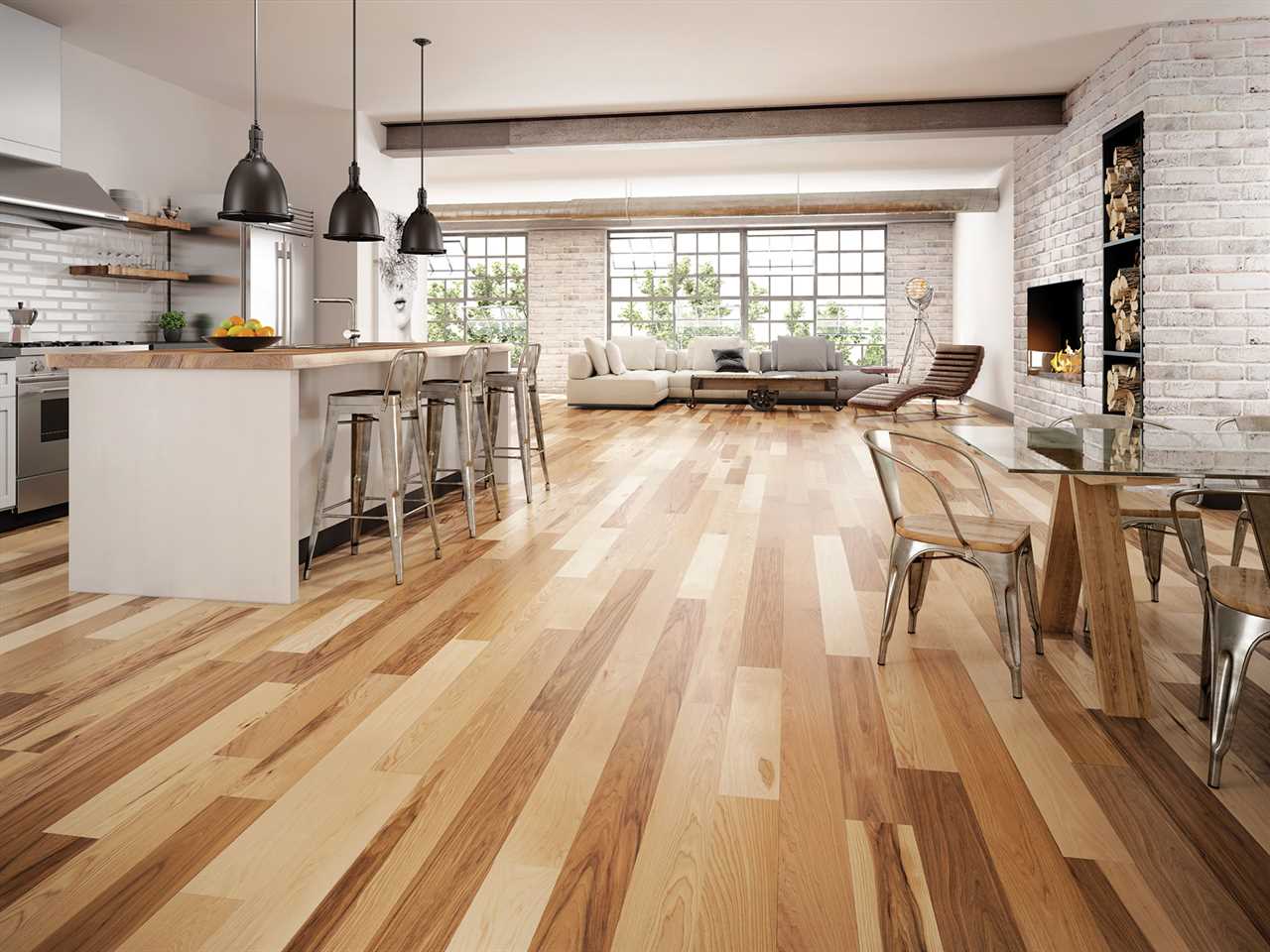
Advantages of Choosing Hardwood Flooring
Various hardwood floors are available in the market, each with unique characteristics and benefits. Some popular types include oak, maple, walnut, and cherry hardwood floors.
Oak hardwood floors are known for their strength and durability, making them popular among homeowners. They come in various shades and finishes, allowing customization to match any interior design style. On the other hand, Maple hardwood floors are lighter in colour and provide a more contemporary look. They are also highly durable and resistant to scratches. Walnut hardwood floors offer a rich and luxurious appearance with dark brown tones. They are also known for their durability and resistance to moisture.
Cherry hardwood floors are widely recognized for their warm and inviting tones, adding a touch of elegance to any space. They are also characterized by their smooth grain patterns and natural lustre. Another type of hardwood flooring is bamboo, which has gained popularity due to its eco-friendly nature. Bamboo is a sustainable material that grows rapidly, making it a renewable resource. It is also highly durable and resistant to moisture, making it suitable for high-traffic areas.
In addition to the different types of hardwood floors, there are also various installation methods to consider. Nail-down installation involves securing the hardwood planks to the subfloor using nails. This method offers a permanent and sturdy installation. On the other hand, floating installation involves attaching the planks without any nails or adhesive. This method allows for flexibility and is ideal for areas with moisture or temperature fluctuations. Another popular installation method is glue-down, where the planks are adhered to the subfloor using a strong adhesive.
When selecting hardwood flooring, it is important to consider factors such as durability, maintenance requirements, and style preferences. Hardwood floors require regular cleaning and maintenance to keep them looking their best. Sweeping or vacuuming regularly, using a damp mop for deeper cleaning, and promptly wiping up spills are all important steps in maintaining hardwood floors. With proper care, hardwood flooring can last for decades and continue to enhance the beauty and value of a property.
Analyzing the Investment: Cost Factors of Hardwood Flooring
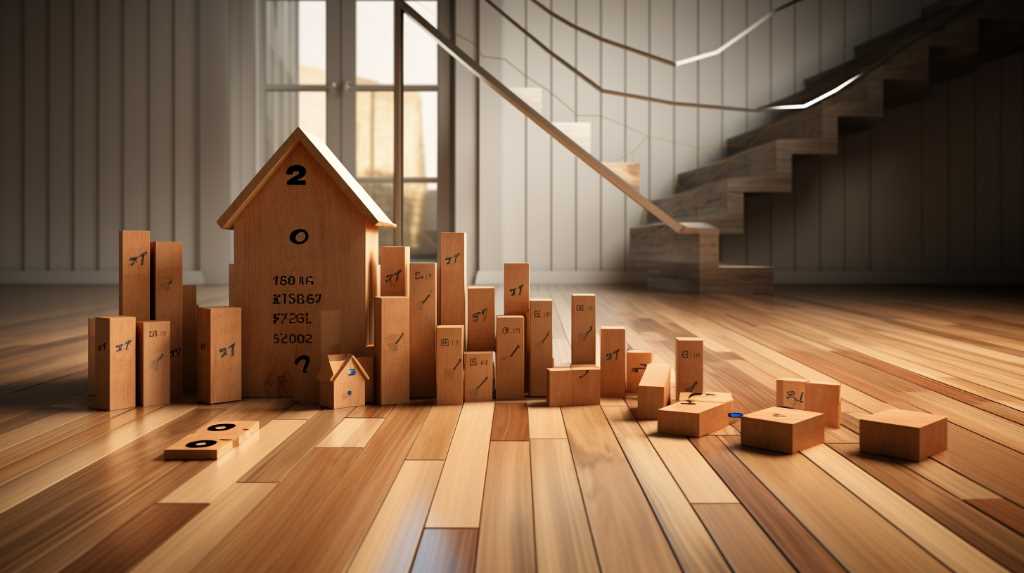
Material Costs: From Basic to Luxury Options
The cost spectrum of hardwood flooring varies widely. Basic options like oak or maple are generally more affordable, while luxury choices like teak or mahogany command higher prices. A recent study indicates the average cost per square foot ranges from $3 to $12, escalating with more exotic woods. Homeowners need to balance their budget with the desired quality and look. Higher-end hardwood can enhance a home’s elegance and resale value, justifying the initial expenditure.
Installation and Maintenance: Long-Term Financial Considerations
While hardwood floors boast longevity, they do require initial installation and ongoing maintenance costs. Professional installation ensures longevity and is generally recommended. HomeAdvisor says the average installation cost ranges from $6 to $22 per square foot, varying by region and wood type. Regular maintenance, including cleaning and occasional refinishing, also factors the overall cost. However, the added value and lifespan of hardwood flooring can offset these expenses.
When it comes to hardwood flooring, understanding the cost is essential for homeowners looking to maximize their home’s resale value and make a sound investment. It’s not just about the upfront installation cost; you must consider the long-term implications, including maintenance, repairs, and replacement expenses.
Hardwood flooring costs can vary significantly based on factors such as the type of wood, complexity of installation, and the condition of your existing floors. According to industry experts, investing in new hardwood flooring can yield an impressive return on investment (ROI) of up to 276%. This means that for every dollar you invest in installing hardwood floors, you could see a $2.76 increase in your home’s value.
Refinishing existing hardwood floors can further boost the ROI, with estimates suggesting a potential return of up to 348%. This highlights the value of maintaining and updating your current hardwood flooring. While the initial cost may be higher, the significant increase in home value justifies the investment for homeowners seeking to maximize their resale potential.
However, it’s important to note that hardwood flooring is not a one-time investment. To keep them in optimal condition, you’ll need to refinish them every 7-10 years, which can cost between $1,000 and $2,500. This recurring expense is a crucial aspect to consider when assessing the overall cost of hardwood flooring and its impact on your home’s resale value.
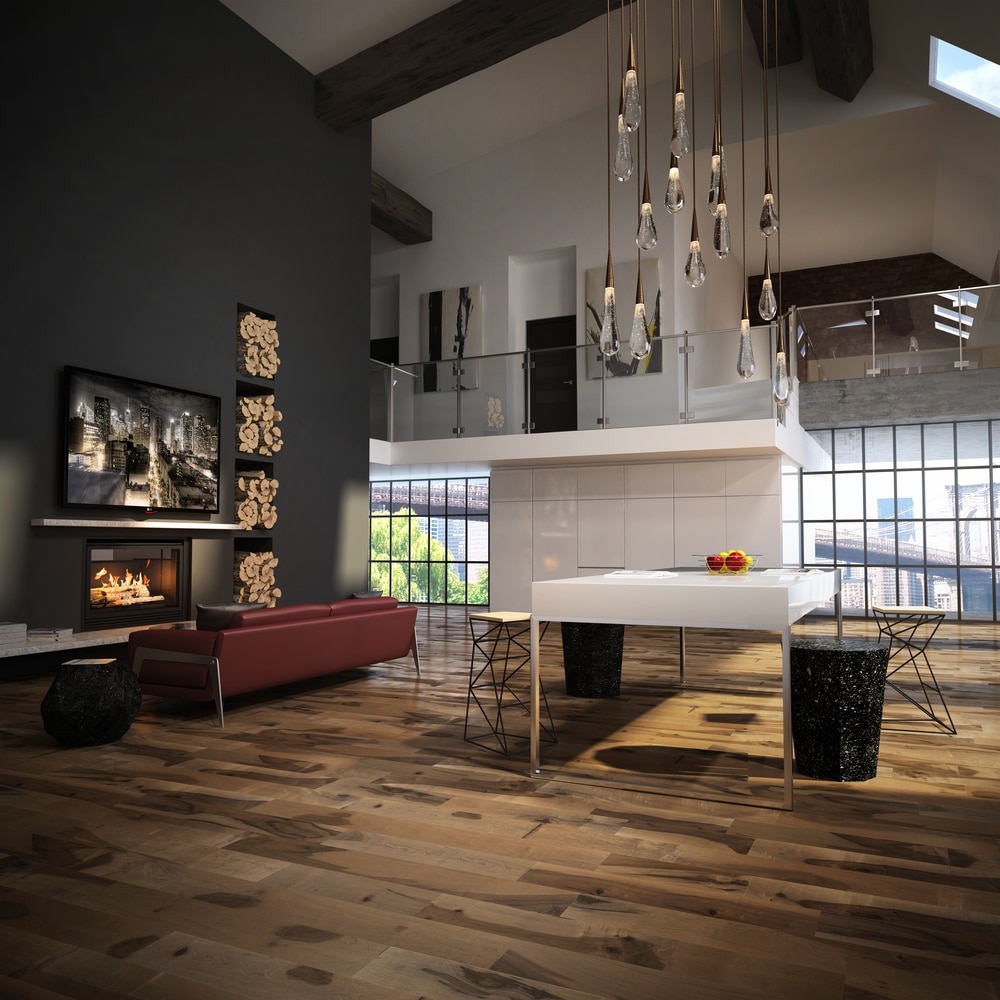
Comparatively, opting for vinyl flooring, which typically needs replacement every 10-20 years, could cost around $98,000 over 100 years. This starkly emphasizes the importance of understanding the long-term costs of different flooring options. Therefore, it’s crucial to remember that while hardwood flooring may have a higher initial cost, it offers a substantial return on investment in the long run.
To further enhance your understanding of hardwood flooring costs, let’s delve into some key considerations:
- Type of Wood: Different wood species have varying price points and characteristics. Hardwoods like oak and maple are popular, offering durability and aesthetic appeal. Exotic woods such as Brazilian cherry or mahogany may come at a higher price but can add a unique touch to your home.
- Installation Complexity: Factors like the size of the area, subfloor condition, and any additional requirements (e.g., stairs or patterns) can affect installation costs. It’s advisable to consult with professionals to assess the specific needs of your project.
- Maintenance and Repairs: While hardwood floors are known for their durability, they may require occasional repairs due to scratches, dents, or water damage. Regular maintenance, including proper cleaning and periodic refinishing, is key to preserving their beauty and longevity.
- Environmental Considerations: Today’s homeowners are increasingly conscious of eco-friendly options. Opting for sustainably sourced hardwood or exploring alternatives like engineered wood can align with your environmental values while providing the desired aesthetic.
Understanding the cost of hardwood flooring goes beyond the initial investment. By considering long-term maintenance, repairs, and replacement expenses, homeowners can make informed decisions that maximize their home’s resale value. Remember, hardwood flooring offers a substantial return on investment, making it a worthy choice for those seeking both aesthetic appeal and financial benefits.
Sources:
- National Wood Flooring Association (NWFA)
- HomeAdvisor
- Consumer Reports
Hardwood Flooring and Property Value: What the Experts Say
Insights from Real Estate Professionals
Real estate experts consistently highlight hardwood floors as a significant enhancer of property value. A study by the National Association of Realtors found buyers willing to pay more for a home with hardwood floors. Furthermore, homes with this feature tend to sell faster. Real estate professionals often recommend hardwood flooring for renovations, citing its appeal to a broad range of buyers and the timeless elegance it adds to any property.
Case Studies: Real-Life Impact on Resale Value
Real-life examples underscore the value hardwood floors add to properties. In several case studies, homes with hardwood flooring sold at a premium compared to those with other types of flooring. For instance, a study in Metro Vancouver found that homes with hardwood floors sold for 2.5% more on average than those without. These findings highlight not just a preference but a tangible financial benefit in choosing hardwood for your home.
Maximizing ROI with Quality Hardwood Flooring
Choosing the Right Hardwood for Your Home
Selecting the right hardwood floor involves considering factors like colour, grain, hardness, and overall style. For instance, lighter woods like maple can create a sense of openness and are ideal for modern interiors, while darker woods like walnuts offer a traditional, cozy feel. It’s also vital to consider the wood’s hardness, especially in high-traffic areas, to ensure durability. Consulting with flooring experts at Canadian Home Style can provide personalized recommendations based on your specific needs and preferences.
Selecting the Ideal Wood Type for Your Home
When it comes to hardwood floors, not all woods are created equal. The type of wood you choose is pivotal in determining both the cost and the potential increase in property value. Hardwoods like oak, maple, and walnut are renowned for their durability and classic appeal, often leading to a higher resale value. On the other hand, while more costly, exotic woods such as Brazilian cherry and mahogany can provide a unique, luxurious look that might appeal to niche markets. The key is to balance your style, home character, and budget.
The Role of Quality and Craftsmanship
The hardwood quality and the installation’s craftsmanship are crucial factors in maximizing ROI. High-quality, well-installed hardwood floors can last for decades, reducing the need for costly repairs and maintenance. This longevity saves money over time and appeals to potential buyers who appreciate durable, high-end finishes. Investing in professional installation and opting for the best quality of wood you can afford will pay dividends in the long term, both in terms of the floor’s lifespan and the overall value it adds to your home.
Sustainable and Eco-Friendly Options
In today’s market, sustainability is more than just a buzzword – it’s a valuable asset. Eco-friendly hardwood options like bamboo or reclaimed wood are not only environmentally responsible choices but are also increasingly sought after by homebuyers. Homes with sustainable features often sell at a premium, making eco-friendly hardwood a smart choice for the planet and your pocket.
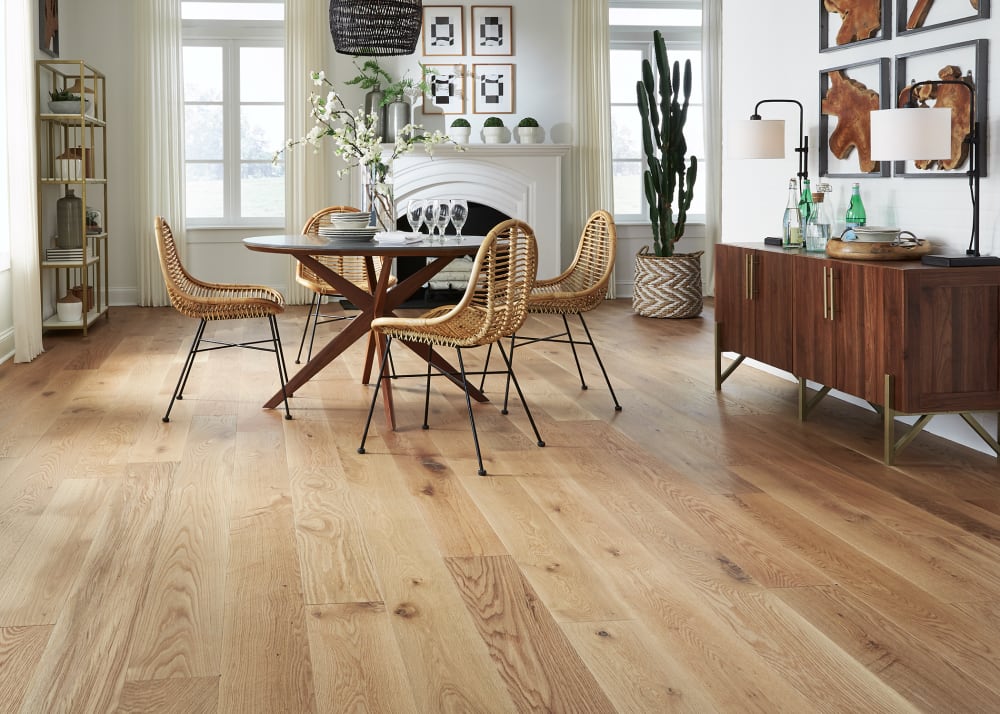
Impact of Maintenance on Long-Term Value
When it comes time to sell, the condition of your hardwood flooring can greatly influence your home’s market value. Regular maintenance, such as cleaning, polishing, and refinishing, helps preserve the beauty and integrity of the floors. Well-maintained hardwood floors can be a major selling point, showcasing the care and attention invested in the property. Prospective buyers are often willing to pay more for a move-in-ready home that requires minimal updates.
Balancing Trends with Timelessness
While choosing hardwood flooring based on current trends is tempting, it’s essential to consider the timeless appeal. Classic hardwood styles and finishes are more likely to remain in vogue, making your home appealing to a broader audience when it’s time to sell. Opt for neutral tones and traditional plank sizes that have enduring appeal, ensuring your floors remain valuable for years to come.
Installation and Maintenance Expenses of Your Flooring Choice
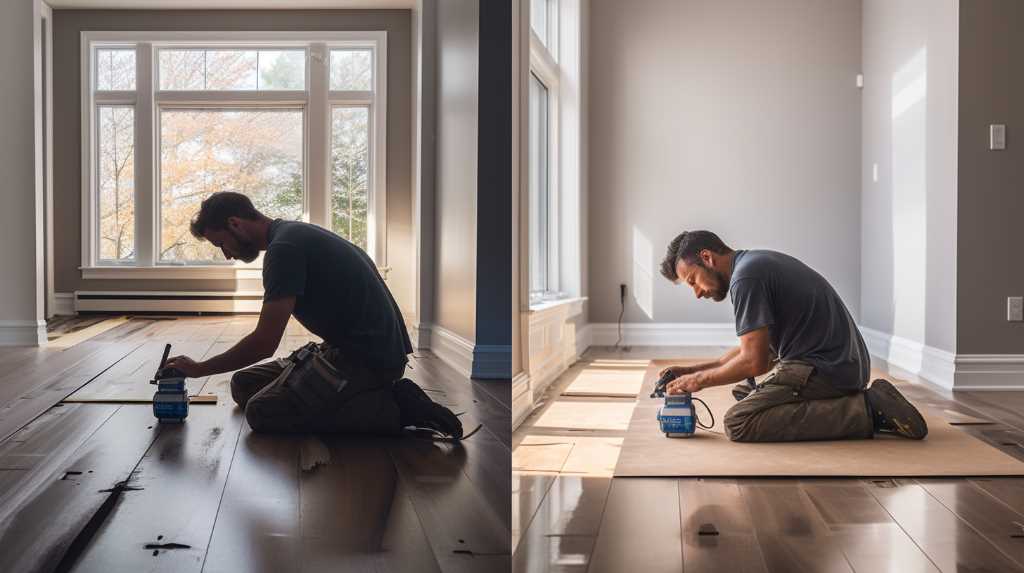
When budgeting for hardwood floors, it’s important to consider installation and ongoing maintenance costs. These expenses can significantly impact the total cost of your home renovation project. The average cost of installing hardwood flooring ranges from $4 to $10 per square foot, depending on the type of wood and the complexity of the installation process.
However, the expenses don’t end there. Regular maintenance is crucial for keeping your floors looking their best and ensuring longevity. This includes cleaning, polishing, and occasional refinishing, which can cost between $1,000 and $2,500 every 7-10 years.
It’s also worth noting the long-term costs of different flooring types. Over 100 years, hardwood flooring costs can vary depending on maintenance efforts. Carpet, on the other hand, can cost around $168,000 over the same period, while vinyl can cost approximately $98,000. Laminate flooring falls in the range of $6,000 to $24,000.
Investing in hardwood flooring not only adds to the resale value of your home but also enhances its aesthetic appeal. With proper maintenance, hardwood floors can last for over a century, offering a substantial return on investment.
However, it’s essential to be mindful of the maintenance expenses to ensure your investment remains sound. Home improvement should balance enhancing your living space and optimizing your resale value.
By considering the long-term costs and benefits of hardwood flooring, you can make an informed decision that aligns with your budget and goals. So, when planning your renovation project, don’t forget to factor in the upfront and maintenance costs for a comprehensive understanding of the total investment.
Evaluating the Impact of Refinishing Costs on Hardwood Floor Resale Value
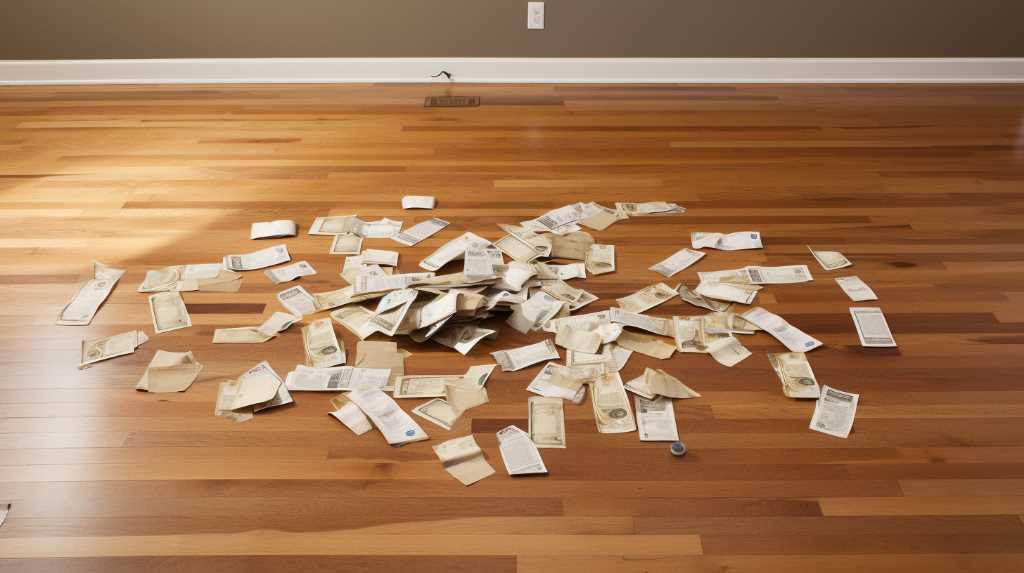
Considering the Impact of Refinishing Costs on Your Hardwood Floors
When it comes to maintaining your hardwood floors, it’s essential to understand the significant impact of refinishing costs. These costs can range from $1,000 to $2,500 every 7-10 years. While this may initially seem a hefty investment, refinishing hardwood flooring can provide a substantial return on investment (ROI), with an average ROI of 348%. This makes it one of the most lucrative home improvements you can make.
To fully evaluate your home’s overall investment and resale value, it’s crucial to consider these costs. You can make informed decisions by weighing the potential increase in resale value against the recurring expenses of maintaining hardwood flooring. Consider the following factors:
- Attracting Higher Offers: Refinished hardwood floors can attract higher offers when selling your home. This can result in a significant return on investment.
- Aesthetic Value: Well-maintained hardwood floors add aesthetic value to your home, increasing its market value. Potential buyers often pay a premium for homes with beautiful hardwood flooring.
- Resale Value: Ignoring scratches, dullness, or wear and tear on your hardwood floors can significantly decrease your home’s resale value. Taking the time and investment to refinish the floors can help maintain their value.
- Faster Sale: Homes with well-maintained hardwood flooring sell faster than those with worn-out floors. Buyers are often drawn to the timeless appeal of hardwood and appreciate the effort put into maintaining them.
You can balance cost and value by considering the implications of refinishing costs. The goal is to increase the value of your home while minimizing expenses. This approach will maximize your return on investment and ensure the highest possible resale value.
Analyzing Hardwood Flooring Replacement Costs and Their Effect on Property Valu
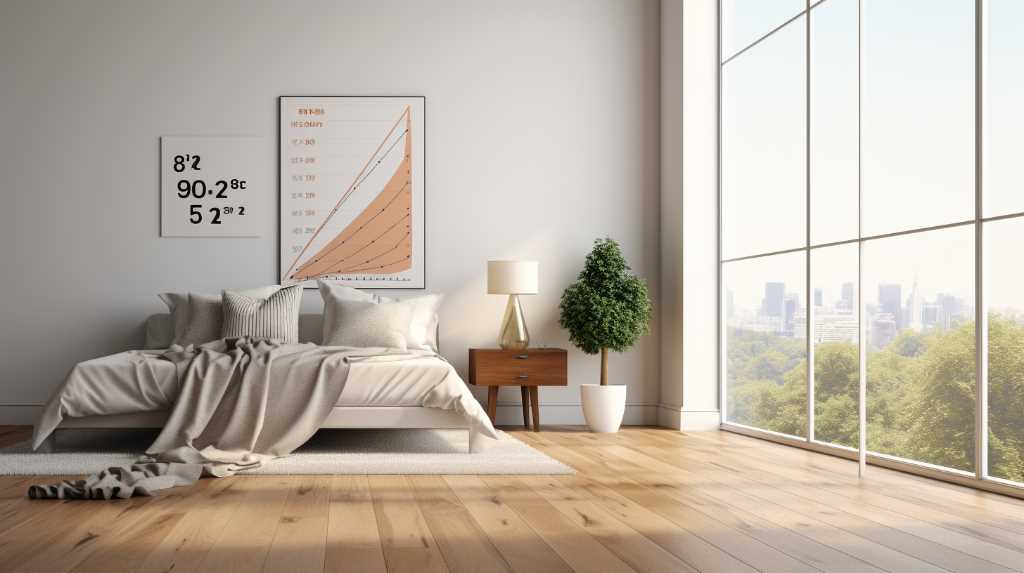
When considering the resale value of your home, it’s essential to consider not only the cost of refinishing your hardwood flooring but also the potential replacement expenses. Installing new hardwood floors can significantly increase the price of your home, but it’s crucial to consider the longevity and durability of different options.
Hardwood floors not only enhance the aesthetic appeal of your home but also add functionality, making it more appealing compared to other houses on the market. While installing pristine new hardwood might be tempting, it’s important to understand the financial implications of replacement costs and resale value.
A well-maintained hardwood floor can last over 100 years but may require refinishing every 7-10 years. In the long run, the cost of refinishing might be lower than replacing the flooring with lower-quality materials that won’t stand the test of time. Let’s take a closer look at the financial impact of your choices:
| Material | Initial Cost | Long-Term Cost |
|---|---|---|
| New Hardwood | High | Low |
| Low-Quality Material | Low | High |
| Refinished Hardwood | Medium | Low |
This table compares the financial implications of different flooring options. While the initial cost of hardwood flooring may seem high, it can significantly increase your property’s and overall home values.
Remember, the decision to invest in hardwood flooring goes beyond the immediate look and feel. It’s about the potential increase in your home’s resale value. By strategically considering these costs, you can ensure a more profitable sale.
The Investment Potential of Hardwood Floors: Assessing ROI and Home Value Enhancement
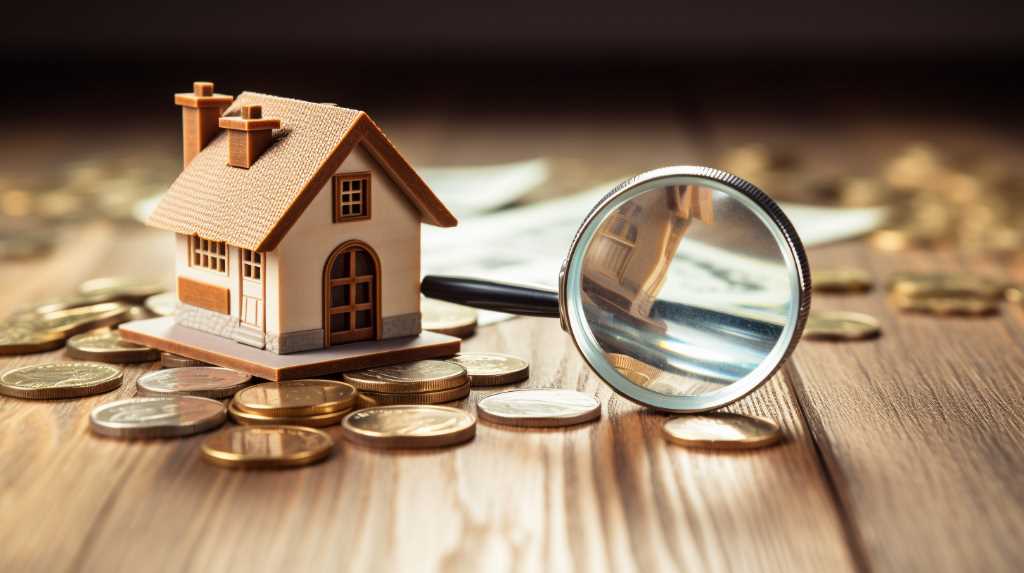
When it comes to home improvement, considering the long-term benefits and potential return on investment is crucial. Hardwood flooring is not only a popular choice for homeowners, but it’s also a solid investment for your home’s future. Let’s explore why hardwood flooring is a wise decision:
1. Increased Home Value: Hardwood floors have a significant impact on the value of your home. It’s widely accepted that homes with hardwood floors sell at a higher price than those without. This makes hardwood flooring a valuable investment in your property.
2. Appeal to Buyers: When attracting potential buyers, hardwood flooring is unmatched. A well-maintained hardwood floor’s timeless elegance and beauty can be a major selling point. Buyers are often willing to pay a premium for homes with hardwood floors, making it a worthwhile investment.
3. Engineered Hardwood for Added Value: Engineered hardwood is worth considering if you’re looking for a durable and cost-effective option. It offers the same aesthetic appeal as solid hardwood but with increased durability. Engineered hardwood can also add value to your home, making it an attractive investment option.
4. Longevity and Timeless Appeal: Hardwood floors are known for longevity and never go out of style. They can last for generations with proper care and maintenance. This long lifespan contributes to your home’s resale value, making the hardwood flooring cost a worthwhile investment.
5. Potential Return on Investment: The potential return on hardwood floors is impressive, with estimates ranging between 70% and 80%. This means that the cost of installing hardwood flooring can be recouped when you sell your home and even potentially increase the sale price.
When it comes time to sell your home, the presence of beautiful hardwood floors can make a remarkable difference in attracting buyers. While various flooring options are available, none match hardwood’s timeless elegance and durability. Investing in hardwood flooring is a wise decision, as it not only enhances the aesthetic appeal of your home but also adds significant value.
Strategic Budgeting for Hardwood Flooring: Balancing Costs and Home Value Increase
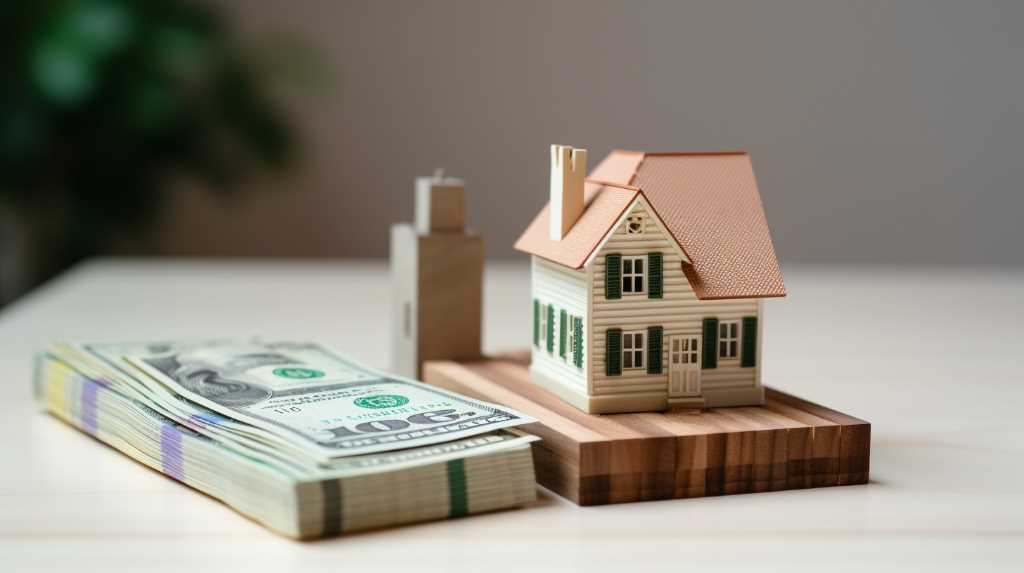
When considering your budget for hardwood flooring, it’s important to consider the initial and long-term maintenance expenses. It can be helpful to compare these costs to alternative flooring options, such as carpet, laminate, or vinyl, to determine the most cost-effective choice for your needs. Additionally, keep in mind that your flooring decision can have a significant impact on the future resale value of your property.
To provide comprehensive and balanced information on this topic, let’s delve into the factors you should consider when budgeting hardwood flooring. By exploring different perspectives and incorporating widely accepted viewpoints, we can help you make an informed decision.
One crucial aspect to consider is the upfront cost of hardwood flooring. While hardwood floors tend to have a higher initial price than alternatives like carpet or laminate, they offer exceptional durability and longevity. This means that, in the long run, hardwood floors can be a cost-effective investment due to their longevity and potential to enhance the value of your property.
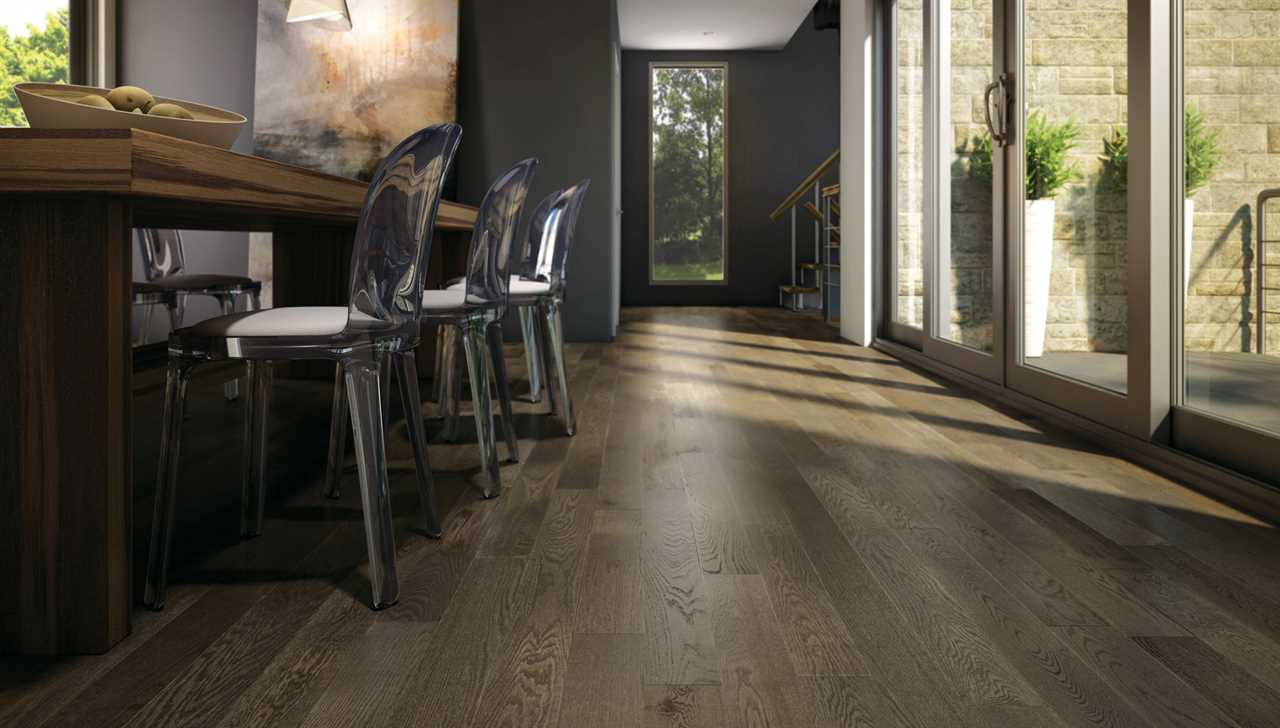
In addition to the upfront costs, it’s important to factor in the long-term maintenance expenses associated with hardwood flooring. Regular cleaning, refinishing, and repairs may be necessary to keep your hardwood floors in optimal condition. However, the maintenance requirements can vary depending on the type of wood, finish, and level of foot traffic in your home. By considering these factors and budgeting for maintenance, you can ensure the longevity and beauty of your hardwood floors.
When comparing hardwood flooring to alternatives like carpet, laminate, or vinyl, it’s essential to consider the potential impact on your property’s resale value. Hardwood floors are widely appreciated for their timeless appeal and ability to elevate the overall aesthetic of a space. Potential buyers often value hardwood floors, resulting in a higher resale value for your property. This is an important consideration when budgeting for hardwood flooring, as it demonstrates the long-term value and return on investment that hardwood floors can provide.
Comparative Cost Analysis of Hardwood and Alternative Flooring Types in Home Value
When considering hardwood flooring, it’s important to have a comprehensive understanding of the costs involved. While the initial investment may be higher than other options, hardwood floors offer long-term savings due to their durability and reduced need for replacements over time.
When budgeting for hardwood flooring, there are several factors to consider. The average cost of hardwood floors ranges from $7 to $12 per square foot, with luxury variants reaching up to $95 per square foot. It’s worth noting that real estate agents often affirm that homes with hardwood floors tend to command higher sales prices. The added value hardwood floors bring to a home is influenced by various factors, including market trends and location. Installing hardwood floors can be a worthwhile investment if you’re preparing to sell your home.
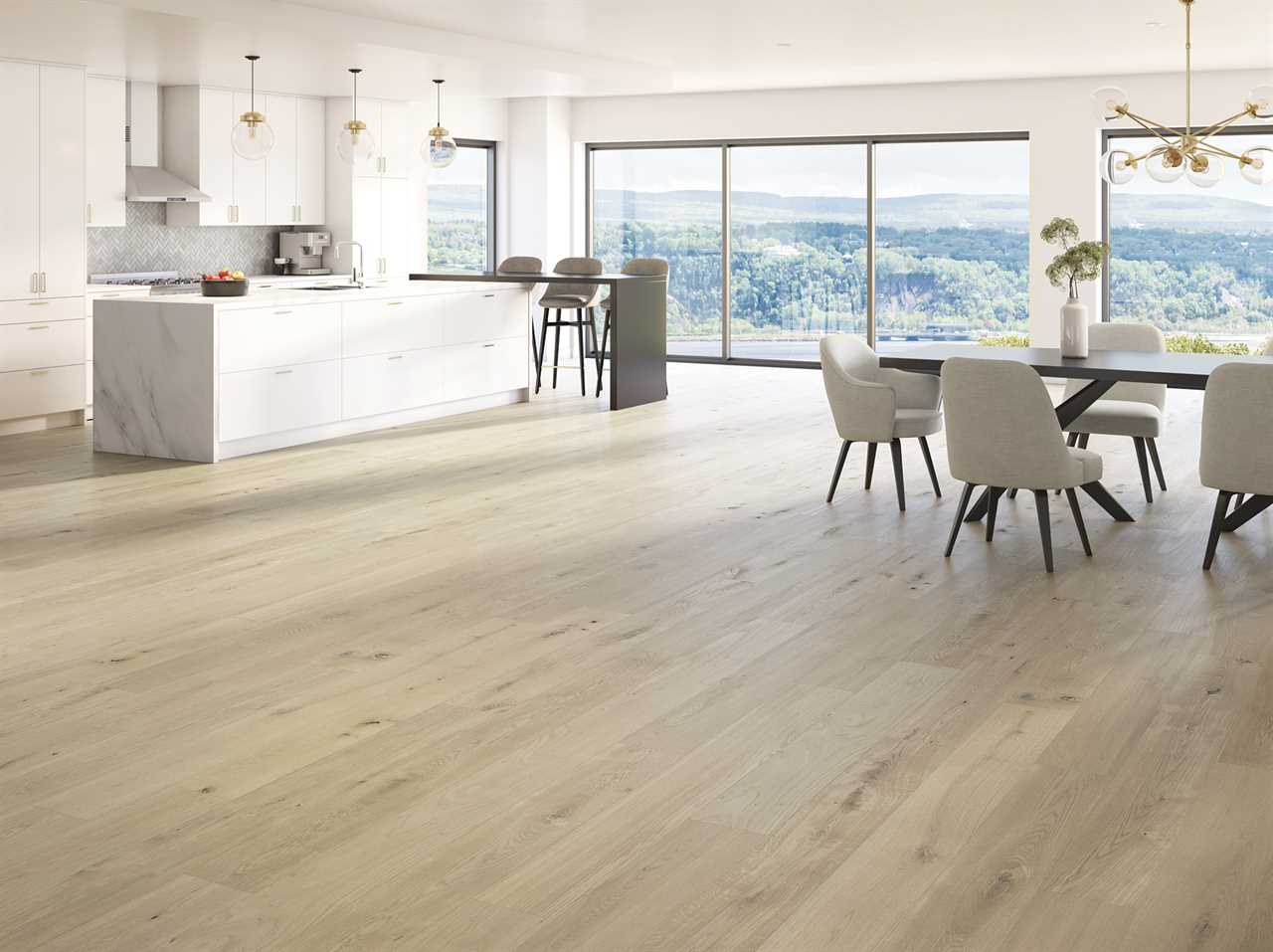
In addition to the upfront costs, it’s essential to factor in potential future maintenance expenses when budgeting for hardwood floors. While they are known for their durability, regular maintenance, such as refinishing, may be required to keep them looking their best.
By carefully considering the costs and benefits of hardwood flooring, you can make an informed decision that aligns with your budget and long-term goals. Remember to seek out reputable suppliers and contractors to ensure the quality and longevity of your investment.
According to a study by the National Association of Realtors, 54% of homebuyers are willing to pay more for a home with hardwood floors.
SOURCE: National Association of Realtors, “Profile of Home Buyers and Sellers” report, 2020.
Maximizing Resale Value with the Right Hardwood Flooring Choice
Comparing Different Flooring Options: Budgeting for Hardwood Flooring and Its Impact on Investment and Resale Value
Regarding flooring options, it’s essential to consider the impact on your investment and resale value. Solid hardwood is widely regarded as the best type of flooring by real estate agents and potential buyers. It’s a major selling point that adds significant value to your home.
Let’s take a closer look at the expected return on investment (ROI) for various flooring types:
- New Solid Hardwood: With an ROI of 276%, investing in new solid hardwood flooring can be wise. Its timeless appeal and durability make it a top choice for homeowners looking to enhance their home’s value.
- Refinished Hardwood: Refinishing existing hardwood floors can offer an even higher ROI of 348%. This option allows you to breathe new life into your floors without the cost of entirely new installations.
- Luxury Vinyl Plank: While not as high as solid hardwood, luxury vinyl plank flooring still provides a respectable ROI of 235%. This type of flooring is known for its durability and affordability, making it a popular choice among homeowners.
- New Carpet: Investing in new carpets can yield an ROI of 280%. While not as long-lasting as hardwood or vinyl, carpet flooring can provide comfort and warmth to your home, appealing to certain buyers.
Remember that the ROI for flooring options can vary depending on your location and the preferences of potential buyers. To make an informed decision, consult a real estate agent familiar with your area’s market trends.
New or refinished hardwood flooring can significantly elevate your home’s resale value. Its timeless beauty and durability make it a worthwhile investment. However, it’s crucial to consider your budget and the specific needs of your home before making a final decision.
Remember, flooring is just one factor in your home’s overall appeal and value. Consider other aspects such as layout, curb appeal, and amenities when evaluating your investment options.
A Closer Look at Return on Investment (ROI) for Flooring Types
- New Solid Hardwood:
- ROI: An impressive 276%.
- Reason: Its timeless appeal and durability make solid hardwood a top choice for homeowners seeking to boost their home’s value.
- Source: National Wood Flooring Association
- Refinished Hardwood:
- ROI: An outstanding 348%.
- Advantages: Refinishing existing hardwood floors can rejuvenate them without the expense of new installations.
- Source: HomeAdvisor’s Flooring Report
- Luxury Vinyl Plank:
- ROI: A respectable 235%.
- Benefits: Known for its durability and affordability, luxury vinyl plank is a popular option among various homeowners.
- Source: Flooring Inc’s Market Analysis
- New Carpet:
- ROI: Approximately 280%.
- Considerations: While not as durable as hardwood or vinyl, new carpet offers comfort and warmth, appealing to specific buyer demographics.
- Source: Carpet and Rug Institute
Frequently Asked Questions
Do Hardwood Floors Increase Resale Value?
Hardwood floors have long been considered a desirable feature in homes, and it’s no wonder why. They offer durability timeless appeal, and can significantly enhance the overall aesthetic of a space. But does having hardwood floors truly increase the resale value of your home? Let’s delve into this topic and explore the various factors that come into play.
Regarding resale value, hardwood floors are often seen as a valuable asset. Many homebuyers prefer hardwood’s elegance and durability, making it a sought-after feature in the real estate market. A study by the National Association of Realtors found that 54% of homebuyers were willing to pay more for a home with hardwood flooring. This statistic alone highlights the strong market preference for this type of flooring.
However, it’s important to consider the installation and maintenance costs when evaluating the return on investment for hardwood floors. Installing hardwood floors can be a significant expense, especially if you’re covering a large area. Additionally, proper maintenance is crucial to preserving the beauty and longevity of hardwood floors. Regular cleaning, refinishing, and promptly addressing issues are essential to maintain their value.
Market preferences also play a role in determining the impact of hardwood floors on resale value. While hardwood floors are generally well-received, it’s important to understand that different regions and buyer demographics may have varying preferences. For example, certain buyers may still prefer carpeted floors in some areas. Understanding your area’s local market dynamics and buyer preferences can help you decide about installing hardwood floors.
Is It Worth Investing in Hardwood Floors?
Investing in hardwood floors can be a smart decision for several reasons. Not only do they offer durability and longevity, but they also add a touch of timeless elegance to any space. Hardwood floors have a unique ability to enhance the aesthetic appeal of a room, creating a warm and inviting atmosphere.
From an environmental standpoint, hardwood floors are an eco-friendly choice. Unlike other flooring options that require regular replacement, hardwood floors can last for decades with proper care and maintenance. This longevity reduces the demand for new materials and minimizes the environmental impact.
In addition, hardwood floors are considered allergy-friendly. Unlike carpets that can harbour dust, pollen, and pet dander, hardwood floors are easy to clean and do not trap allergens. This makes them an excellent choice for individuals with allergies or respiratory conditions.
When it comes to the investment aspect, hardwood floors can provide a solid return on investment. According to industry experts, homes with hardwood floors sell faster and at higher prices than those without. The timeless appeal and durability of hardwood floors make them a desirable feature for potential buyers.
It’s important to note that while hardwood floors offer numerous benefits, they may not be suitable for every situation. Budget, lifestyle, and location should be considered before making a decision. Additionally, alternative flooring options like laminate or engineered wood can mimic the look of hardwood floors at a lower cost.
What Flooring Is Best for Resale Value?
When maximizing the resale value of your home, one crucial factor to consider is the type of flooring you choose. Hardwood flooring often takes the lead in comparing different flooring types, but it’s important to explore all options to make an informed decision. Factors such as carpet versus hardwood, the value of laminate, and the impact of sustainable choices like bamboo can all play a role in determining the best flooring for resale value.
Let’s delve into the details to view this topic comprehensively. Hardwood flooring is highly desirable among homebuyers due to its timeless appeal and durability. It adds a touch of elegance to any space and can significantly elevate the overall aesthetics of a home. Additionally, hardwood floors are known for their longevity, making them a worthwhile investment.
However, it’s essential to consider alternative perspectives as well. Carpet flooring, for example, offers a cozy and comfortable feel that some buyers may prefer, especially in bedrooms or living areas. Carpet can also help with sound insulation and provide a warmer atmosphere. On the other hand, carpets may require more maintenance and may not have the same long-term durability as hardwood.
Laminate flooring is another option worth considering. It offers a cost-effective alternative to hardwood while mimicking its appearance. Laminate is known for its durability and easy maintenance, which can appeal to potential buyers. However, it’s important to note that laminate may not have the same prestige or longevity as genuine hardwood.
In recent years, sustainable flooring options like bamboo have gained popularity. Bamboo flooring is environmentally friendly and offers a unique and modern look. It’s a durable choice that can withstand high-traffic areas and is moisture-resistant. This eco-friendly option may attract buyers who prioritize sustainability and want to make an environmentally conscious choice.
To provide some context, according to recent studies, hardwood flooring has consistently shown a positive impact on resale value. Homes with hardwood floors sell faster and at higher prices than those without. However, it’s important to remember that each real estate market is unique, and factors such as location, buyer preferences, and overall market conditions can influence the impact of flooring choices on resale value.
Can Flooring Add Value?
Flooring has the potential to add significant value to your home. When considering flooring options, it’s important to explore a variety of factors, such as material comparisons, budgeting considerations, and the pros and cons of laminate versus hardwood.
One important aspect to consider is the installation cost. Depending on the flooring type, installation costs can vary significantly. It’s important to factor this into your budget when assessing the potential value-add of different flooring options.
Maintenance is another crucial consideration. Some types of flooring, like hardwood, may require more maintenance and care than others. Understanding the maintenance requirements of different flooring materials can help you make an informed decision that aligns with your lifestyle and long-term value goals.
For those who prioritize eco-friendliness, there are also sustainable flooring options available. These options contribute to a greener environment and enhance the value of your home for environmentally conscious buyers.
Luxury flooring options, such as marble or high-end hardwood, can also significantly increase the value of your property. These materials often exude elegance and sophistication, appealing to buyers who are willing to pay a premium for a luxurious aesthetic.
It’s worth noting that if you embark on a DIY flooring project, it’s important to consider the impact on your insurance. Some insurance policies may not cover damages or accidents resulting from DIY projects. Additionally, understanding the expected lifespan of your chosen flooring material can help maximize it.
Why Choose Canadian Home Style in Metro Vancouver for your Hardwood Flooring Needs:
Canadian Home Style is your family-owned and operated flooring retailer with a showroom in North Vancouver, BC. We provide full-service commercial and residential flooring solutions across the Lower Mainland with an extended warranty. We are proud BC Floor Covering Association (BCFCA) and the National Wood Flooring Association (NWFA) members. In addition, we have won the Consumer’s Choice Awards back-to-back in 2021, 2022, 2023, and 204 for our commitment to business excellence. We are considered the highest-rated flooring experts in Metro Vancouver. We pride ourselves on holding the highest standards in the flooring industry. We have a strict policy of “not selling or displaying any products we wouldn’t want in our homes to uphold our high standards.” Before we select a product to feature, we carefully assess product quality, off-gassing, warranties, and responsible sourcing. Book now to visit our North Vancouver flooring showroom; we can help you choose the perfect floor for your home or business.
Our mission is to help homeowners create beautiful homes that reflect their lifestyles while reducing energy consumption and conserving resources. We provide our clients with innovative products, services and education. Our vision is to become Canada’s leading sustainable flooring solutions provider. Our values include integrity, respect, honesty and transparency. These principles guide us as we strive to provide outstanding customer service.
We believe that our success depends on the success of our clients and their customers. We work hard to ensure our clients get the most out of their investments. Our team consists of highly skilled professionals who are experts in their field. They have years of experience working together and know what works and what doesn’t. They understand how to solve problems quickly and efficiently. We are committed to providing excellent customer service. We listen carefully to our client’s concerns and suggestions. We take these into account when planning and executing projects. We always strive to exceed expectations.
Our Commitment to Excellence and Sustainability
Canadian Home Style stands out for its unwavering commitment to quality and sustainability. Winning the Consumer’s Choice Award for four consecutive years is a testament to this dedication. Our selection process rigorously evaluates each product’s environmental impact, ensuring we offer only the most sustainable and high-quality options. This philosophy resonates with our customers who seek responsible yet stylish home solutions.
Award-Winning Services: A Testament to Quality
The accolades Canadian Home Style has received, including the Consumer’s Choice Award, reflect our high product quality and customer service standards. These awards, based on customer feedback and industry standards, underscore our position as a leader in the flooring market in North Vancouver. This recognition is a badge of honour and a promise to our customers that they are choosing the best in the market.
Making an Informed Decision for Your Home
Choosing the right flooring is about balancing aesthetics, functionality, and budget. Homeowners must consider the initial cost and the long-term benefits and drawbacks of different flooring options. Clear, factual information helps consumers make informed decisions aligning with their lifestyle and financial goals.
Services We Offer:
Main Areas of Service in British Columbia:
| Entity Name | Description | Source Link |
|---|---|---|
| Hardwood | A type of dense and durable wood used in various applications, especially in high-quality furniture and flooring. | Source |
| Wood Flooring | Flooring made from timber, offering durability and a classic aesthetic for various interior designs. | Source |
| Wood | The hard, fibrous structural tissue found in the stems and roots of trees and other woody plants. | Source |
| Mahogany | A straight-grained, reddish-brown timber, valued for its durability and fine appearance. | Source |
| Do It Yourself | The method of building, modifying, or repairing things without direct aid from experts or professionals. | Source |
| Wood Type | Refers to the various kinds of wood used in construction, furniture, and flooring, each with unique properties. | Source |
| Bamboo | A fast-growing, renewable and versatile plant used in many applications, including as an eco-friendly flooring material. | Source |
| Oak | A common type of hardwood, known for its strength and used in furniture, flooring, and timber-frame buildings. | Source |
| Bamboo Floor | A type of flooring made from bamboo, known for its sustainability, strength, and unique aesthetic. | Source |
| Hickory | A type of American hardwood known for its strength, stiffness, and density, often used in tool handles and flooring. | Source |
| Interior Design | The art and science of enhancing the interior of a building to achieve a healthier and more aesthetically pleasing environment. | Source |
| Renewable Resource | A natural resource that can replenish with the passage of time, either through biological reproduction or other naturally recurring processes. | Source |
| Adhesive | A substance used for sticking objects or materials together. | Source |
| Teak | A tropical hardwood tree species, known for its durability and water resistance, widely used in construction and furniture. | Source |
| HomeAdvisor | A digital marketplace that connects homeowners with prescreened, local service professionals for home improvement, maintenance, and remodeling projects. | Source |
| United States Dollar | The official currency of the United States and several other countries, commonly used in international transactions. | Source |
| Refinishing | The process of applying a new finish or surface to an object, commonly used in wood flooring restoration. | Source |
| Species | The basic unit of biological classification, a group of living organisms consisting of similar individuals. | Source |
| Engineered Wood | A composite material made from wood fibers, particles, or veneers bonded together, often used in flooring. | Source |
| Environmental Values | Concepts or principles concerning the importance of protecting the natural environment. | Source |
| Consumer Reports | An American nonprofit organization dedicated to unbiased product testing, consumer-oriented research, and public education. | Source |
| Metro Vancouver Regional District | A metropolitan area in British Columbia, Canada, known for its diversity, economy, and natural environment. | Source |
| Canada | A country in North America, known for its vast landscapes, multicultural diversity, and strong economy. | Source |
| Neutral Tones | Colors or shades that do not show a strong hue and are typically considered unobtrusive and versatile. | Source |
| Laminate Flooring | A multi-layer synthetic flooring product, designed to mimic materials like hardwood, but at a lower cost. | Source |
| Home Improvement | The process of renovating, remodeling, or making additions to one’s home. | Source |
| Informed Decision | A decision made based on knowledge of the possible outcomes, benefits, and risks. | Source |
| Lamination | The process of creating a material in multiple layers to achieve improved strength, stability, or appearance. | Source |
| Vancouver | A major city in western Canada, located in the Lower Mainland region of British Columbia. | Source |
| Lower Mainland | A major metropolitan area in British Columbia, Canada, surrounding and including Vancouver. | Source |
| Extended Warranty | An insurance policy on a product that extends the warranty period offered by the manufacturer. | Source |
| British Columbia | A western province of Canada, known for its natural beauty and diverse geography. | Source |
| Realtor.com | A real estate listings website, providing a comprehensive database of properties for sale and rent. | Source |
| Professional Builder | A term used to describe individuals or companies specializing in building construction. | Source |
| Plywood | An engineered wood product made from thin layers of wood veneer glued together. | Source |
| Wood Veneer | Thin slices of real wood applied over a base or structure to achieve the appearance of solid wood. | Source |
| Trade Association | An organization founded and funded by businesses that operate in a specific industry. | Source |
| Estimator | A professional who calculates the cost, time, labor, and materials needed for a construction project. | Source |
| Real Estate Agent | A licensed professional who arranges real estate transactions, acting as an intermediary between buyers and sellers. | Source |
| General Contractor | A professional responsible for overseeing construction projects and coordinating the work of specialized contractors. | Source |

